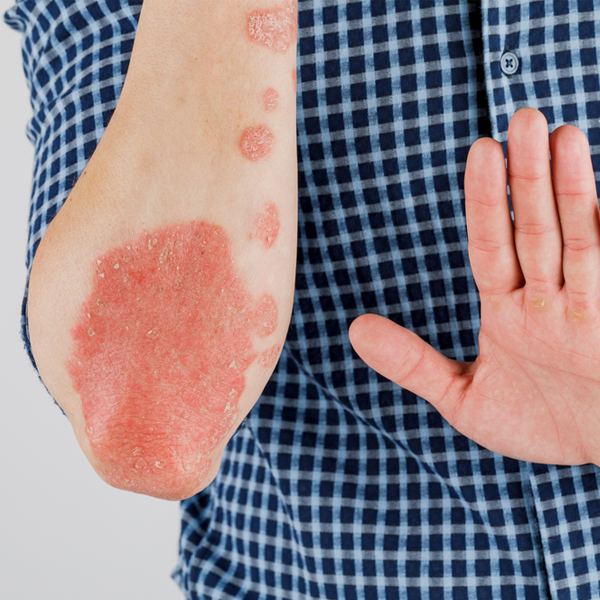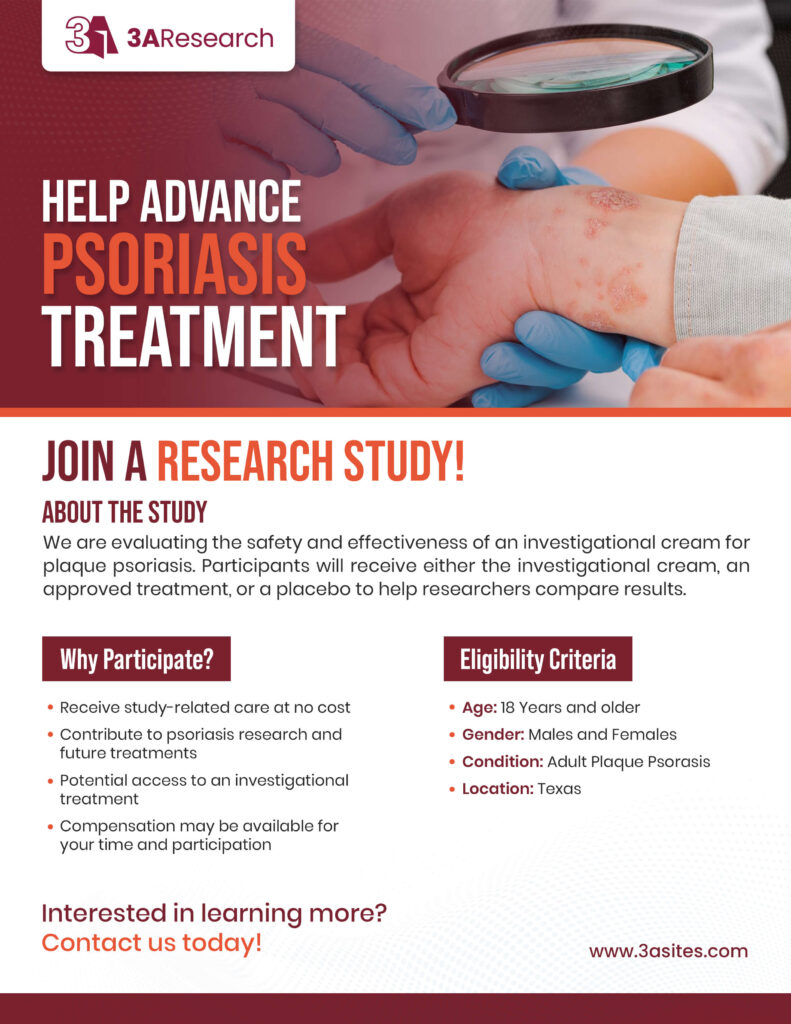Adult Plaque Psoriasis Clinical Trials
Living with plaque psoriasis can be challenging, and finding the right treatment isn’t always easy. 3A Research is conducting adult Plaque Psoriasis Clinical Trials to study investigational options for managing this condition. See if you qualify to take part in this important research.
Application for Current Clinical Research Study

Plaque Psoriasis Clinical Trials
Understanding Plaque Psoriasis and Research Studies
Plaque psoriasis is a papulosquamous disorder that leads to raised, scaly patches on the skin. It can cause itching, discomfort, and visible plaques that may impact daily life. While treatments are available, responses to them vary from person to person.
Clinical research plays a key role in evaluating potential treatments of plaque psoriasis and understanding the condition better. Our adult Plaque Psoriasis Clinical Trials in El Paso, TX focus on investigational treatments that are being studied for their effects on symptoms.
If you are considering participation in the adult Plaque Psoriasis Research Study in Texas, you may receive study-related care and contribute to ongoing research. Every step forward in clinical studies helps expand knowledge about plaque psoriasis and its management.
Important Information About Participation
Girls and Boys

Age
18 Years and older

Gender
Males and Females

Condition
Adult Plaque Psoriasis

Location
Texas

About Adult Plaque Psoriasis Study
This study is evaluating the safety and effectiveness of an investigational cream compared to an approved treatment and a placebo in people with plaque psoriasis. Participants will be randomly assigned to one of three groups: the investigational cream, the approved treatment, or a placebo (a cream with no active ingredient).
The study is double-blind, meaning neither the participants nor the researchers will know which treatment is being used. It is being conducted across multiple locations to gather reliable data. The goal is to determine if the investigational cream works as well as the approved treatment and to assess its safety in patients with plaque psoriasis.
By participating, individuals can contribute to psoriasis research, receive study-related medical care at no cost, and help improve future treatment options.
What Happens During a Clinical Trial?
If you take part in this adult Plaque Psoriasis Clinical Trial, you will receive study-related care and monitoring from healthcare professionals. Each study has specific eligibility criteria and procedures. If you’re interested in learning more about research participation, explore the available Plaque Psoriasis Clinical Trials in El Paso, TX today.
Enroll Now
[contact-form-7 id=”366ebe8″ title=”Contact form 1″]
Frequently Asked Questions
Is plaque psoriasis deadly?
Plaque psoriasis itself is not deadly, but it is a chronic autoimmune condition that can significantly impact quality of life. However, people with severe psoriasis may have an increased risk of other health conditions, such as cardiovascular disease, diabetes, and psoriatic arthritis, which can have serious health implications if not managed properly.
How do you treat plaque psoriasis in adults?
Treatment for plaque psoriasis depends on the severity of the condition. Options include:
- Topical treatments: Corticosteroids, vitamin D analogs, and moisturizers to reduce scaling and inflammation.
- Phototherapy: UVB light therapy to slow skin cell growth.
- Systemic medications: Oral or injectable biologics and immunosuppressants (such as methotrexate, cyclosporine, or biologic therapies) for moderate to severe cases.
- Lifestyle modifications: Managing stress, avoiding triggers, and keeping the skin well-moisturized can help prevent flare-ups.
What is the root cause of plaque psoriasis?
Plaque psoriasis is an autoimmune condition where the immune system mistakenly attacks healthy skin cells, causing rapid skin cell turnover. The exact cause is unknown, but genetic and environmental factors play a role. Triggers such as stress, infections, certain medications, and skin injuries can lead to flare-ups.
What does plaque psoriasis look like?
Plaque psoriasis appears as raised; red patches of skin covered with thick, silvery-white scales. These plaques often develop on the scalp, elbows, knees, and lower back, but they can appear anywhere on the body. The affected areas may be itchy, painful, or prone to cracking and bleeding.
Does plaque psoriasis get worse with age?
While plaque psoriasis does not necessarily worsen with age, factors such as stress, weakened immune function, and other health conditions can make symptoms more severe over time. Some people experience periods of remission, while others may have persistent or worsening flare-ups if the condition is not well managed.
